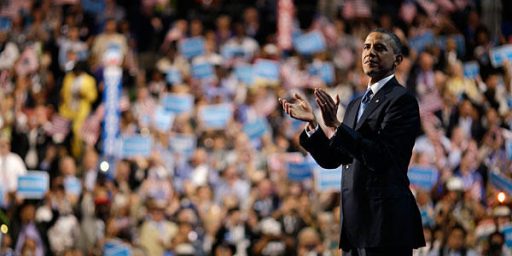It’s the War, Stupid
Michael Tomasky‘s opener in today’s Prospect:
It’s still possible that John Kerry could win — although, of course, anytime a liberal columnist opens his column with a phrase like that, it’s not a good sign.
No kidding. Given months of conventional wisdom that the race was essentially a toss-up but George Bush was nonetheless in dire trouble, we suddenly are at a point in the race where it looks as if he will coast to re-election. Certainly, the news hasn’t gone Kerry’s way in quite some time, what with a no bounce convention, a surprisingly effective insurgent advertising campaign by the Swift Boat vets, a much higher than expected Bush bounce from the GOP convention, and now the Rather fiasco, Kerry can’t catch a break.
Tomasky sees an odd paradox at work:
The problem begins with the fact that majorities of the public tend to agree with Democrats on the issues. This isn’t universally true, of course, but it’s true with regard to more issues (perhaps many more issues) than not. On health care, the environment, investment, education, just about everything except national defense, majorities lean toward the Democratic position.
This sounds like a good thing. But in fact, it’s an incredibly bad thing, because it leads Democrats to believe that they can win on the issues.
He argues that, in reality, Democrats get pummeled because Republicans are inordinately skilled at turning attention away from substantive policy discussions and into a referendum on character. He goes on, in sum detail, to explain how the GOP created–falsely, in his view–an impression of Kerry the Flip-Flopper.
Kevin Drum spots the rather glaring hole in this argument:
Hmmm. “Everything except national defense.” Does that suggest something?
It should. Yes, Bill Clinton was unusually articulate and charismatic, but he also ran in a pair of elections in which national defense wasn’t an issue. During the 80s, when the Cold War was uppermost in people’s minds, Republican candidates won three elections in a row. And in 2000, George Bush won a squeaker only by convincing people he was a compassionate centrist who was practically a Democrat himself.
As brilliant a campaigner as Bill Clinton was, he would not have been able to defeat Bush–a horrible campaigner–in 1992 had the Cold War still been underway. The GOP didn’t grasp until far too late that nobody cared that Clinton had dodged the draft, since the commander-in-chief role was hardly uppermost in their minds. Bush 41 was a solid wartime president but did not inspire confidence in his ability to manage the economy, the role that became paramount in that election. In 1992, Clinton convinced people he was no Michael Dukakis and in 2000 the future Bush 43 convinced people he was no Newt Gingrich.
It’s all about 9/11, Iraq, terrorism, and national security, baby. This election is going to be won on that issue, and Kerry needs to convince the country that he can handle it better than Bush. And really, considering the botch Bush has made of national security, that shouldn’t be all that hard.
Bottom line: Republicans aren’t avoiding the issues. It’s just that their signature issue happens to be the one people care most about this year. Democrats had better figure that out pronto.
Agreed. Tomasky is correct that the Bush campaign has managed to cherrypick Kerry’s record to make Kerry’s past inconsistencies appear more stark than they really are. But that’s hardly unusual; it’s what campaigns do. But Kerry has been amazingly accomodating in doing everything he can to reinforce that image with respect to the Iraq War. Ironically, Kerry’s position papers on the war (and foreign policy in general) are quite reasonable, if largely indistinguishable from the Bush policy. Yet, his on again, off again support for the war effort is the most bizarre effort I’ve ever seen in a major party nominee on the central issue of the day.




Clinton made it clear he was about sending money used for the military elsewhere… the ‘ peace dividend’. He was quite proud, during his campaign, that he knew comparatively little about international politics. (International affairs, however, were perhaps another topic)
Clinton of course went on, once elected on that premise, despite cutting the military budgets and manpower, to send the Military on more missions than any of his predesessors had.
No great wonder, then, that the subsequent Gore and Kerry campaigns, trying to play up the same kind of Anti-Military meme, didn’t play quite so well with the voters.. who apparently don’t have as short a memory as had been thought.
As to cherry picking, it should perhaps be said that the Bush Campaign has had to work less hard in that effort, than his father’s campaign had to work against Dukakis’.
The GOP’s problem in 92 was not identifying that nobody cared that Clinton had dodged the draft, but WHY. The reason was simple; Ronald Reagan’s successes. The end of the cold war brought with it the argument that we didn’t need the military, or a military minded man in the WH.
In the GOP mindset, and I think correctly, the import of a strong military never goes away. The argument was in 92 that the destruction of the USSR left us more vulnerable, not less, given that there would now be new threats coming to the fore, and likely less manageable than the Soviets were.
And eight years of Bill Clinton later, (plus a couple months) we found out that line of thinking was the correct one.
If there’s anything out of all of this that is suprising it’s that the vast majority of Americans seemingly understand this, if we’re to take the polls with any seriousness.
Kerry cannot now, nor, given his history, could he have EVER convinced the electorate that he could have dealt with this situation any better.
(Can YOU say ‘more sensitive war’?)
Actually, Kerry has idenified from the beginning that Iraq and how the President handles the issue, would be the key to this election, which is why he’s trying to paint himself as a war hero.
But as I say, his anti-war, anti-military history keeps getting in his way.
It also doesn’t help Kerry that over half of his base is also anti-war, anti-military. The more he plays up the ‘look at me in uniform’ bit, he tees off his biggest block of suporters.
The Democrats love to assert that Americans largely agree with them on the issues. But they never prove it, they just assert it. It’s awfully materialistic of them, since they seem convinced that “values” issues shouldn’t matter more to any voter than “economic interest” – nor do they give the voters any credit for having the perspicacity to see that Democrat “economics” is not necessarily in their interest either.
IOW, they delude themselves. And we don’t call them on it often enough.
Interesting commentary on the commentary on the commentary. Ah, I love the blogs. Anyway, to quote the normally buffoonish Dick Morris, “In order to run as a war president you have to win the war”. Morris is absolutely right here. Joe Klein pointed out in a recent piece that Kerry’s criticism of the war over the cost is just idiotic for many reasons – numbers mean nothing, and voters will pay anything if it means defending the nation. A smarter and more effective critique would be on the conduct of the war. And a great place to hit the President is the handling of Fallujah. The incidents there in April are everything Bush said was disastrous about Vietnam – politicians making military decisions and then meddling at the worst times. The decision to attack – and then retreat halfway through – in Fallujah was disastrous as a number of recent stories point out. Kerry should challenge Bush in a direct manner and say, “Fight this war to win, or get the hell out”. Sure, everybody will point out how Kerry’s own positions are this way and that way but a statement of this sort will turn the attention back on a significant failure in an area of Bush’s greatest political strength – as Commander in Chief. Kerry should also begin quoting regularly from the recent CSIS report detailing how the situation is getting worse on every level in Iraq. Not to talk down the war or the justness of it, but to say that the President’s leadership has been lacking. The CSIS report is a perfect roadmap for Kerry to establish his bona fides in the Iraq War. And while the CSIS report offers lots of pragmatic, wonkish solutions to the near term in Iraq, it’s also a rather blunt document. Bungling around the way he has will only allow Bush to continue talking in generalities about the War on Terror without having to discuss the nasty little details, many of which are very unpleasant for the President.
I can’t claim to have studied Kerry’s position papers on foreign policy. But I’ve heard his guru and likely secretary of state Holbrooke, whose key meme is that Kerry will repeal the “Bush Doctrine” of taking preemptive action, including using military force, to fight the war on terrorism. That’s a pretty major difference between the two. And if one agrees — as I do with you, Dr. Joyner, and (gasp) with Kevin Drum, that the war on terror is what the election is likely to be decided upon — it’s a solid, substantive basis for picking between the two candidates.
I never understand the assertion made that Bush has badly bungled national security. How can you have fewer than ZERO attacks on US soil since 9/11? Who could beat that record? And why don’t we call them on that assertion whenever they make it?